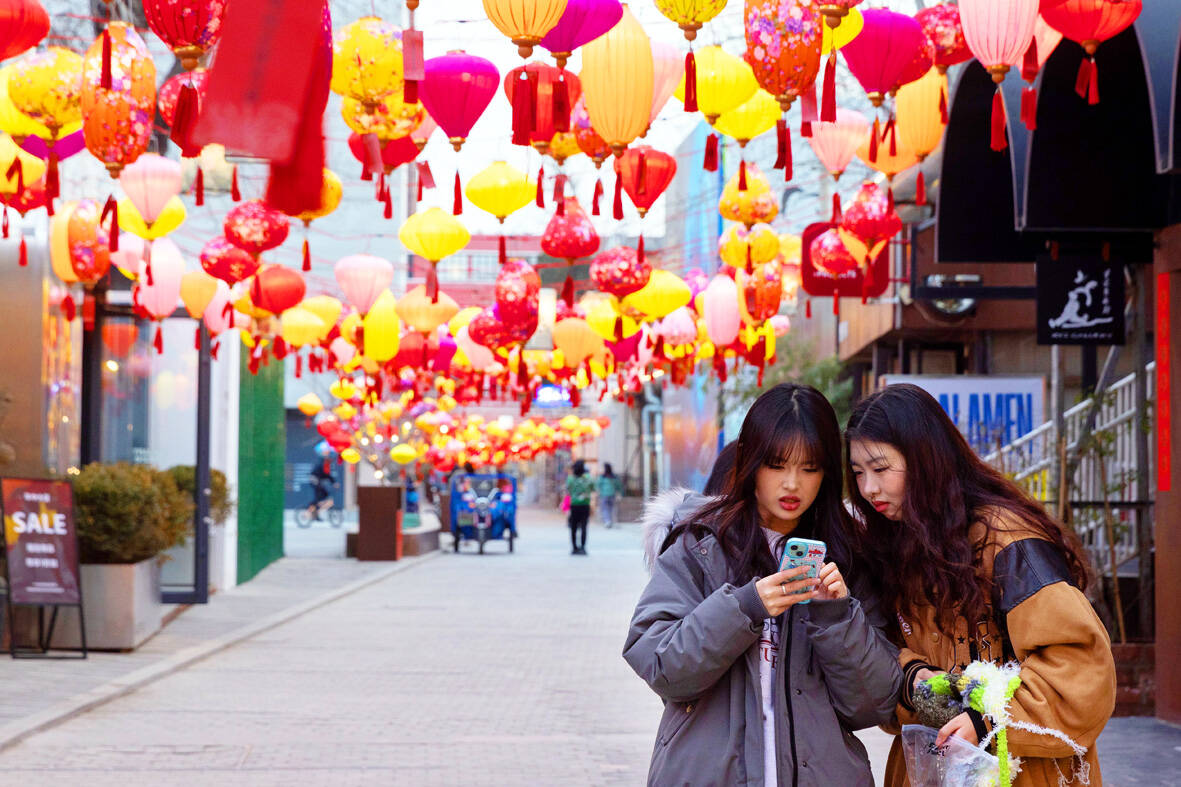Marriages in China last year plunged 20 percent to a record low as young people resisted government efforts to convince them to settle down and have more babies.
Marriages in China dropped from 7.7 million in 2023 to 6.1m last year, data from China’s civil affairs ministry showed. The figure was less than half the number registered in 2013, and the lowest since record keeping began in 1986.
The data also showed that 2.6 million couples filed for divorce in 2024, up 1.1 percent from the previous year.

Photo: EPA-EFE
The sharp dive in nuptials was amplified by 2023’s brief rebound as people caught up on weddings after several years of COVID restrictions. There was also speculation that people had avoided getting married in 2024 because it was an inauspicious “widow year” in the Chinese lunar calendar.
But the broader trend remained on track — stubbornly resisting the ruling Communist party’s push to reverse China’s demographic decline.
“It’s not that people don’t want to get married, but that they can’t afford to get married!” said one Changzhou-based commenter on China’s social media platform Weibo, which has had more than 46 million engagements about the topic since Monday.
China has the world’s second-largest population and for decades enforced tight restrictions on child birth, including a one-child policy. But now, as China faces a decreasing and aging population, which threatens the country’s economic future, the authoritarian government wants people to have more children.
A big part of that push is trying to encourage more marriages. Births are tightly linked to marriage in China, with childbearing out of wedlock discouraged by traditional values and various government regulations.
But the decades of restrictions mean there are fewer people today who are of marriageable age — and those who are, aren’t interested in marriage or children.
“For many young people, not getting married is an active choice. At the same time, having their own lifestyle and enjoying single life is also a big reason,” said another commenter on Weibo.
“Women can support themselves and do not need to rely on men. The willingness to get married is much lower than in the past.”
Concerns over high youth unemployment, the skyrocketing cost of living, education and childcare, and a pushback against traditional gender roles have held fast against the government’s financial entreaties and policy overhauls.
“Collapsing marriage rates reflect a convergence of social forces: a declining population of young adults, a darkening economic outlook for recent graduates, changing attitudes towards marriage, and escalating gender polarization between men and women,” said Carl Minzner, senior fellow for China studies at the Council for Foreign Relations, who described the drop in nuptials as “extreme.”
On Weibo commenters also noted how society appeared to have become “more tolerant” with some highlighting what they said was a shift in the level of pressure being exerted by families at recent Chinese new year gatherings.
“Ten years ago, what I heard most from relatives was about which daughter or son was not married by the age of 27 or 28. Now, what I hear is about those basically 30 years old and above. [Getting married before] 27 or 28 is no longer eligible for discussion.”
Many commenters also cited the controversial introduction of a divorce cooling-off period in 2021, making them wary of the “easy entry and strict exit” for marriage. Others noted China’s refusal to legalize same-sex marriage or provide equivalent rights to same-sex de facto couples.
“Why did the number of marriage registrations drop again in 2024? Because I am a lesbian,” wrote one woman.

Wooden houses wedged between concrete, crumbling brick facades with roofs gaping to the sky, and tiled art deco buildings down narrow alleyways: Taichung Central District’s (中區) aging architecture reveals both the allure and reality of the old downtown. From Indigenous settlement to capital under Qing Dynasty rule through to Japanese colonization, Taichung’s Central District holds a long and layered history. The bygone beauty of its streets once earned it the nickname “Little Kyoto.” Since the late eighties, however, the shifting of economic and government centers westward signaled a gradual decline in the area’s evolving fortunes. With the regeneration of the once

Even by the standards of Ukraine’s International Legion, which comprises volunteers from over 55 countries, Han has an unusual backstory. Born in Taichung, he grew up in Costa Rica — then one of Taiwan’s diplomatic allies — where a relative worked for the embassy. After attending an American international high school in San Jose, Costa Rica’s capital, Han — who prefers to use only his given name for OPSEC (operations security) reasons — moved to the US in his teens. He attended Penn State University before returning to Taiwan to work in the semiconductor industry in Kaohsiung, where he

In February of this year the Taipei Times reported on the visit of Lienchiang County Commissioner Wang Chung-ming (王忠銘) of the Chinese Nationalist Party (KMT) and a delegation to a lantern festival in Fuzhou’s Mawei District in Fujian Province. “Today, Mawei and Matsu jointly marked the lantern festival,” Wang was quoted as saying, adding that both sides “being of one people,” is a cause for joy. Wang was passing around a common claim of officials of the People’s Republic of China (PRC) and the PRC’s allies and supporters in Taiwan — KMT and the Taiwan People’s Party — and elsewhere: Taiwan and

Perched on Thailand’s border with Myanmar, Arunothai is a dusty crossroads town, a nowheresville that could be the setting of some Southeast Asian spaghetti Western. Its main street is the final, dead-end section of the two-lane highway from Chiang Mai, Thailand’s second largest city 120kms south, and the heart of the kingdom’s mountainous north. At the town boundary, a Chinese-style arch capped with dragons also bears Thai script declaring fealty to Bangkok’s royal family: “Long live the King!” Further on, Chinese lanterns line the main street, and on the hillsides, courtyard homes sit among warrens of narrow, winding alleyways and